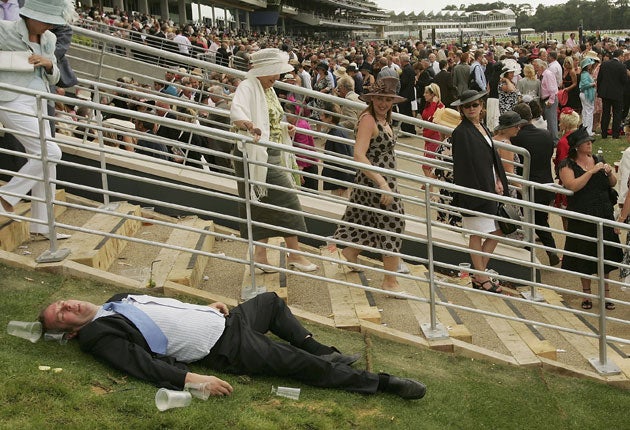A pill to cure social drinkers?
Now drink addiction is a middle-class affliction, drugs giants are seeking treatments

Your support helps us to tell the story
From reproductive rights to climate change to Big Tech, The Independent is on the ground when the story is developing. Whether it's investigating the financials of Elon Musk's pro-Trump PAC or producing our latest documentary, 'The A Word', which shines a light on the American women fighting for reproductive rights, we know how important it is to parse out the facts from the messaging.
At such a critical moment in US history, we need reporters on the ground. Your donation allows us to keep sending journalists to speak to both sides of the story.
The Independent is trusted by Americans across the entire political spectrum. And unlike many other quality news outlets, we choose not to lock Americans out of our reporting and analysis with paywalls. We believe quality journalism should be available to everyone, paid for by those who can afford it.
Your support makes all the difference.The millions of people across the developed world who drink a few glasses of wine every night after work or look forward to repeated shots with chasers at the weekends may today be adding up to a major health and social problem. Could there be a pill to help them?
A reassessment of the nature of addiction, particularly to alcohol, is starting to pique the interest of the major pharmaceutical firms. For years the industry has been lukewarm, assuming either that finding a cure for alcoholism is impossible, or else that the target market would not make for great returns. Now changing Western attitudes and cheap supermarket-supplied alcohol have made excessive drinking more widespread, including among the middle classes.
Just as with depression treatment 30 years ago, alcoholism research could be approaching a "Prozac moment" when it will become more acceptable, for doctors to prescribe a pill to help people through a bad patch, says Dr Mark Willenbring, a US addiction expert.
Data from Thomson Pharma, a company that monitors the drug industry, shows there are 24 drugs in development for alcoholism, including at least 10 in mid-stage trials.
The US drug giants Merck and Eli Lilly are pursuing two possible drugs through human trials, and the biotech firm Alkermes has three drugs in development. The race to find more effective drugs is among the hottest areas in alcoholism research. Some are looking at compounds that hit dopamine receptors – the "reward" pathway in the brain. Another possibility showing early promise is topiramate, a medicine which hits multiple sites in the brain and is used in epilepsy and migraine treatment. It has shown some ability to cut alcohol intake in heavy drinkers.
Other scientists, such as Dr Colin Drummond at the UK's National Addiction Centre, are focusing on the brain's stress pathways. Dr Drummond is about to start an experiment with mifepristone, which he hopes may reduce the extreme levels of the stress hormone cortisol released in the brain when alcoholics stop drinking.
Join our commenting forum
Join thought-provoking conversations, follow other Independent readers and see their replies
Comments